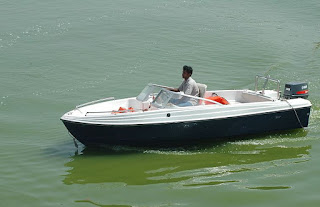The ABC’s of Buying a Boat
By Diane Tait
 |
| Image courtesy wikimedia |
Now that spring has sprung in NE Florida, many people
head for the water. While the surf might
still be a bit chilly, that doesn’t deter boaters who are all too eager to set
sail. Being a boater myself, I can tell
you that skippers in Florida have it made in the shade. Not only does the boating season in the
Sunshine State extend nearly year-round, but skippers can choose to cruise both
inshore and offshore. This makes boating
much more forgiving when storm season arrives.
Instead of bobbing around on the high seas in ten-foot chop, Florida
boaters can navigate the intracoastal waterway where waves never top
3-feet. If you’ve been considering
joining the fun by buying a boat, this week’s blogs will tell you what you need
to know.
What
Does BOAT Mean?
The first thing most boat owners will tell you is that
a boat is a hole in the water into which you pour money. They will also point out the acronym BOAT
means Break Out Another Thousand. I’m
not telling you this out to deter you from buying a boat. I’m just letting you know that a boat can be
a costly hobby for the uninitiated.
While you can buy a boat just as you would a car, understand from the
outset that the bigger the boat, the more expensive a proposition it is. Especially once you add a motor. Below are the questions you need to answer
before you start shopping for a watercraft.
A.
Are you planning on buying a trailerable
vessel, or will the boat require dockage?
Trailers can save you the cost of keeping your boat in a marina. That being said, depending on the size of
your vessel and your ability to maneuver the trailer into and out of the water,
it can be almost as daunting as taking your boat to sea. Even negotiating a slippery boat ramp with a skiff
can be a tricky proposition.
| Image courtesy Max Pixel |
C.
Cabin cruiser or open boat? Once you step up in class to a boat with a
cabin, not only are there more systems requiring your attention, generally a
cruiser is a lot harder to handle.
Unlike cars, cruising boats don’t have brakes, other than that provided
by reverse thrust. I’ve seen
inexperienced boaters crash into docks, get hung up on pilings and smack into
channel markers when the tide was running due to their lack of on-the-water experience.
D.
Do you plan on paying cash or financing
your purchase? As soon as you get a note
on a boat you’ll be required by the bank to insure your vessel. While this isn’t a bad thing even if you pay
cash for your boat, the bank wants to make sure that if the vessel is damaged
or sunk, they can recoup their investment.
Since hurricanes and storms are the norm in the Sunshine State, before
you buy that boat it wouldn’t hurt to have a chat with your friendly insurance
agent to find out what it will cost to insure it.
E.
Expect the unexpected. On a boat this means you need to invest in
safety gear like anchors, fire extinguishers, life vests, a throwable cushion,
a marine radio, distress signals, a bailer and an air horn.
 |
| Image courtesy USCG |
F.
Forget about the Coast Guard coming to
your rescue unless your vessel is sinking or on fire. You might want to look into acquiring a Sea
Tow membership as well, since you never know when you might need some
assistance on the water.
G.
Get some advice from a more seasoned
skipper before you buy a boat. The
problem with being a fledgling boater is you don’t know what you don’t
know. While it’s simplicity itself to
shop for a boat online or make the rounds of boat dealers and marinas, trying
to determine how seaworthy a vessel is can be tougher than you’d think. Depending on the size of the vessel, it may
even be necessary to have a marine survey of the boat before the bank will
finance it.
H.
Hoping to sail away right away? Not so fast, skipper. Before you can legally operate a boat, you
need to register and title the boat. If you’re
purchasing a used boat, this entails doing a title search and transfer just as
you would before purchasing a house.
You’ll also need to make sure the boat doesn’t have any liens against it,
or you could wind up owning someone else’s problem.
I.
If you’re seriously thinking of buying a
boat, remember that many boaters consider the two happiest days of their
boating lives the day they buy their boat and the day they sell it.
Diane Tait
owns and operates A&B Insurance. To find out more about how you can save
money on boat insurance, go to her site or fill out the form at right.


The first thing you need to do if you don't want your new boat to be a hole in the water is not to buy more boat than you can safely handle.
ReplyDeleteI have owned a couple of boats in my life and found that they are holes in the water. Enjoy them while you use them, maintain them and protect them with insurance. Then when you do sell them you will get the best return.
ReplyDelete